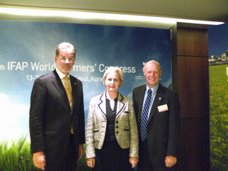A woman, farming in Malawi, illustrates the effectiveness of support to local farmer groups (members of NASFAM) for farm diversification, improved marketing and household food security. The group approach for training increased her motivation and the provision of cheaper inputs via the farmer association has pulled her further into the business.
“The support project to NASFAM and other associations in Malawi by SCC, reached 60.000 farmers. One of the members witnesses that she joined a local farmer group and has since been regularly visited by the field workers of the organisation. The organisation also provides her with group training for crop diversification. She also had access to fertilizer and seeds for sweet potato at a cheaper price. This has helped her to grow sweet potatoes, water melon and tropical fruit in addition to the traditional maize. She is now able to feed her family and also sells some products at the local market. The sales provide her with an additional monthly income of 400 SEK. She has been able to construct a brick house with this profit.” (SCC)
Wednesday, June 25, 2008
Saturday, June 7, 2008
Knowledge utilised is power
A farmer, member of Nembure farmers’ cooperative society in Kenya, describes how he managed to break the circle of poverty through farm diversification and improved marketing. The fact to interact and socialise with other farmers of the cooperative has been the start of and has been his major motivation to remain member of the cooperative. The cooperative has further supported him all the way to smoothly roll out his first initiatives towards more intensive farming. Despite the improvements and continuous support, he finds he remains vulnerable to market price fluctuations.
“He had always been eager for information and received this information by socialising with people. This was initially also his main reason for joining the cooperative. In the cooperative, he was informed on the potential of growing passion fruits. Initially he planted 70 un-grafted plants and his initiative grew eventually to cultivating 280 of grafted plants. He also started investing in poles, wires and sprays to fully protect his plants. According to him, the production costs are reasonable but market price fluctuations can pose problems. The fruits are harvested and marketed locally on a weekly basis and brokers collect them from the farm to sell at the Embu market. His passion fruits fetch an average Kenyan shillings 6,000 per month, which is an additional income to his traditional coffee and subsistence farming. Since he succeeded in growing passion fruits, he has also expanded his farm towards papaya, water melon and tomatoes. These complement his income when the passion fruit price is low. He feels relieved because he doesn’t have to worry anymore about family expenses and school fees. He is a proud father now.”
“He had always been eager for information and received this information by socialising with people. This was initially also his main reason for joining the cooperative. In the cooperative, he was informed on the potential of growing passion fruits. Initially he planted 70 un-grafted plants and his initiative grew eventually to cultivating 280 of grafted plants. He also started investing in poles, wires and sprays to fully protect his plants. According to him, the production costs are reasonable but market price fluctuations can pose problems. The fruits are harvested and marketed locally on a weekly basis and brokers collect them from the farm to sell at the Embu market. His passion fruits fetch an average Kenyan shillings 6,000 per month, which is an additional income to his traditional coffee and subsistence farming. Since he succeeded in growing passion fruits, he has also expanded his farm towards papaya, water melon and tomatoes. These complement his income when the passion fruit price is low. He feels relieved because he doesn’t have to worry anymore about family expenses and school fees. He is a proud father now.”
Subscribe to:
Comments (Atom)
Check these interesting contributions from other sites & blogs
- On Farmers Organization in Egypt
- Law on farmers Organizations in China
- Interview with FAO officials on Farmers Organizations
- Farmers use mobile phones
- comment of Kees Blokland on anti-CAP campaigning
- Poverty & growth blog of the World Bank
- Gapminder statistics visualized
- Guide for implementing ICT projects - iCommons december 2006
- Africa: tools of liberalisation - Patricia Daniel, University of Wolverhampton, England
- Business and the rural poor - Harvard Business School
- Profiling Asian Farmers Association members - Jan 4th, 2007
- Fiji Times report on AgriCord grants to Sugar Farmers - January 04, 2007
- Increasing Impact - marrying micro-credit and micro-insurance - The disconfort Zone, january 4th, 2007
- Programs that Fight Poverty - Institute for Advanced Technologies in Global Resilience - November 17, 2006
- University of Chicago Press Journals reports on GMOs - January 25, 2007
- Biotech crops to help reduce poverty - Kauser A Malik, in the Daily Times (Pakistan) January 25, 2007
- Why does China grow so fast - Michael Spence The Wall Street Journal 23 january 2007





